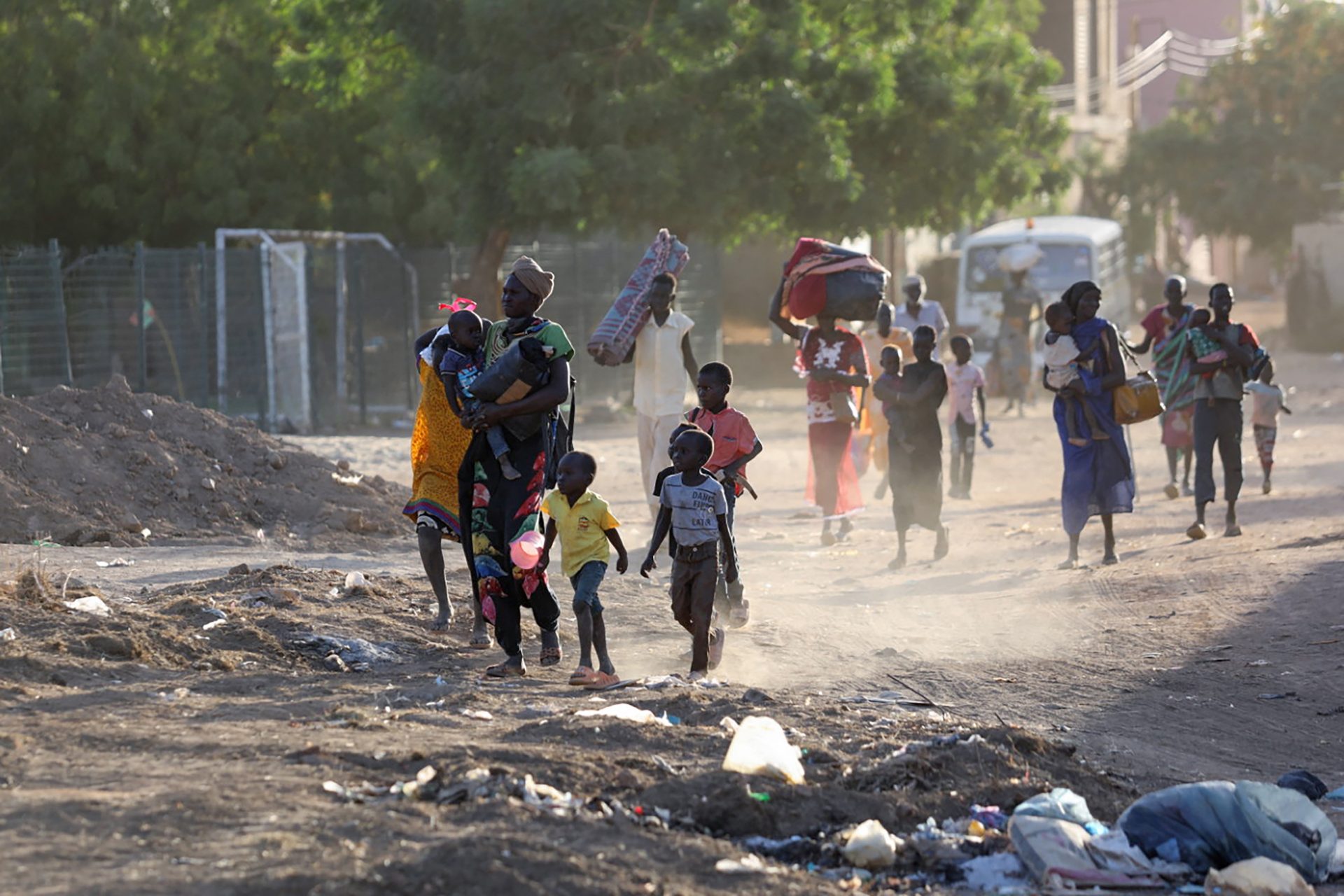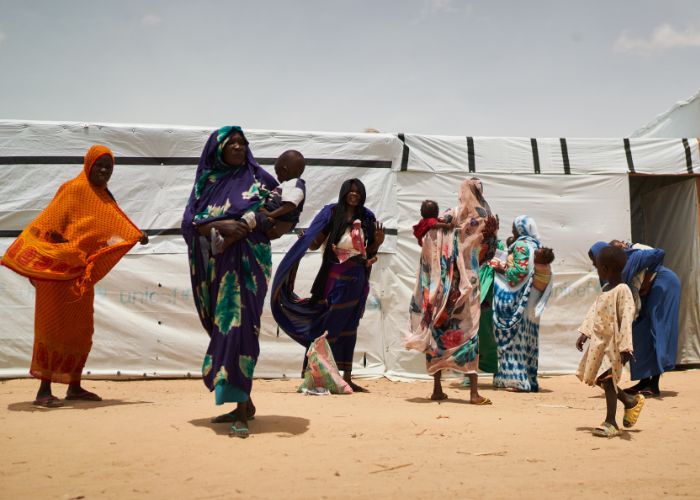Since fighting in Sudan intensified in April, food prices have doubled. Movement is becoming increasingly restricted, making it even more difficult for people to access food and water. The World Food Programme has warned that fighting in Sudan could further plunge millions more into hunger.
Violence and threats to aid workers are putting civilians at risk and preventing them from accessing basic needs
Action Against Hunger has been providing humanitarian aid in Sudan since 2017. But now humanitarian aid workers and members of the international community are being targeted. According to the UN, five humanitarian workers have been killed so far. Humanitarian activities have been interrupted, with many reports of looting of humanitarian supplies. This makes it even harder to get food and water to the people who need it most. Making Sudan one of the hungriest countries in the world.
Evacuation operations of international staff and their families from many foreign countries are ongoing. After he was evacuated, Reza Mohammadi, Financial Coordinator at Action Against Hunger in Sudan, could only express his concern for those who are staying: “My family and I feel safe now, but we cannot stop thinking about our national colleagues and their families.”
Rafiullah Tariq, Head of our MEAL Department in Sudan, added, “our thoughts are for all our national colleagues who are suffering from this unjustified war.”
We’re concerned about the safety and wellbeing of our national staff in Sudan after the evacuations take place. They’re essential to resuming aid operations.
Conflict and climatic shocks: key drivers of food insecurity
Conflict remains the main driver of global food insecurity around the world. An estimated 50,000 acutely malnourished children in Sudan have had treatment disrupted because of the conflict, according to WHO data. Most food insecure people around the world, including 75% of all chronically malnourished children under the age of five, live in countries affected by armed conflict and violence.
Prolonged droughts, erratic rains, and crop failure have led to a food insecurity crisis in Sudan – made worse by droughts, floods, and disease outbreaks. In 2021, when Sudan’s armed forces launched a military coup, the prevalence of food insecurity in some states of the country was as high as 65% in West Darfur, 59% in Central Darfur, and 56% in North Darfur. Rates of malnutrition were increasing across Sudan at a concerning rate, especially among children. Approximately 3 million childrenunder five suffering from malnutrition annually, according to UNICEF.
Despite the outpouring of solidarity from the Sudanese people, human suffering continues to deepen
“The situation here is calm but there is fear within people due to what is going on in Khartoum,” says El Fateh Edis Edris Eisa, Head of Base of Action Against Hunger in Sudan’s Blue Nile state. “People don’t know what will happen next.”
So far, over 400 people have been killed and at least 3,700 have been injured. Many are fleeing violence on foot. Nearly 4,000 people have fled Sudan to South Sudan and 20,000 to Chad, which is already home to more than 400,000 Sudanese refugees. It’s estimated that these numbers could increase to 270,000 as people continue to flee violence.
There are also those who are fleeing but are staying in Sudan. According to our team in the White Nile region, thousands of people are arriving from Khartoum, and some are taking refuge in schools and mosques.
Sudanese people are helping those who are fleeing hotspots of the conflict. An international humanitarian worker evacuating from Sudan, whose identity we’re protecting for security reasons, says “on our way from Khartoum to Gedared, we saw many villagers offering water and food to people leaving Khartoum. These people are amazing. I hope we can get back on our feet so we can continue to serve and work together.”
Why is fighting happening now in Sudan?
The conflict erupted on 15 April after negotiations over the transition to a civilian government stalled. In December 2022, after months of negotiations, Sudan’s military and civilian leaders signed a preliminary deal to end the military rule that has governed the country since October 2021. A final deal was due to be signed earlier in April, on the fourth anniversary of the overthrow of long-ruling Omar al-Bashir in a popular uprising. Both the Sudanese Armed Forces (SAF) and the Rapid Support Forces (RSF) were required to cede power, which provoked tensions.
A 72-hour ceasefire was agreed on 25 April between the two warring parties after mediation from the United States and Saudi Arabia. However, Action Against Hunger staff in Khartoum say the ceasefire was only respected during the first day but it’s not being respected anymore. There is still heavy shooting and air bombardments.
What is Action Against Hunger is calling for
- We call on the Sudanese Armed Forces (SAF) and the Rapid Support Forces (RSF) to guarantee the protection of civilians and welcome ongoing regional and international efforts for the permanent end to hostilities in the short term whilst also looking into a durable, long-term solution. It’s key that both sides avoid the impact of violence on civilian populations, notably by allowing access to humanitarian assistance.
- We urge both parties to take all possible measures to avoid harm to civilians, infrastructure and humanitarian workers. Humanitarian workers must be allowed to provide a safe and timely response. We deplore the recent killing of humanitarian staff in Darfur as well the attacks on key infrastructure such as health facilities. It’s also important to protect critical infrastructure such as water, telecommunications, and electricity services. Ensuring markets are still working normally is vital for people to cover basic needs as well as to manage the increasing prices of staple foods.
- We welcome the recent, albeit intermittent, ceasefire and call on all parties to the conflict to maintain humanitarian corridors and to end hostilities so civilians can find safety, access basic services as well as critical humanitarian assistance. We urge both parties to guarantee humanitarian organisations have free and unimpeded access to assess communities’ needs, replenish supplies, and deliver aid swiftly and effectively.
- We call also on the international community to consider the humanitarian impact of any political measures to be taken by parties to the conflict. For example, if international or regional sanctions are imposed, humanitarian agencies and workers must be exempted to guarantee the swift and effective delivery of humanitarian aid.
- We remind the international community that before the ongoing crisis, Sudan was facing a dire humanitarian situation with 15.8 million people – 30% of the population – expected to need humanitarian assistance in 2023. Yet barely 14% of the humanitarian need was covered. We’re deeply concerned this violence may lead to the rapid and dramatic deterioration of the humanitarian situation. We urge the international community to anticipate these needs and swiftly mobilise the necessary resources to save lives and protect affected communities.
What are we doing?

We’re currently carrying out a needs assessment in Wadi Fira in Chad to assist Sudanese refugees.



